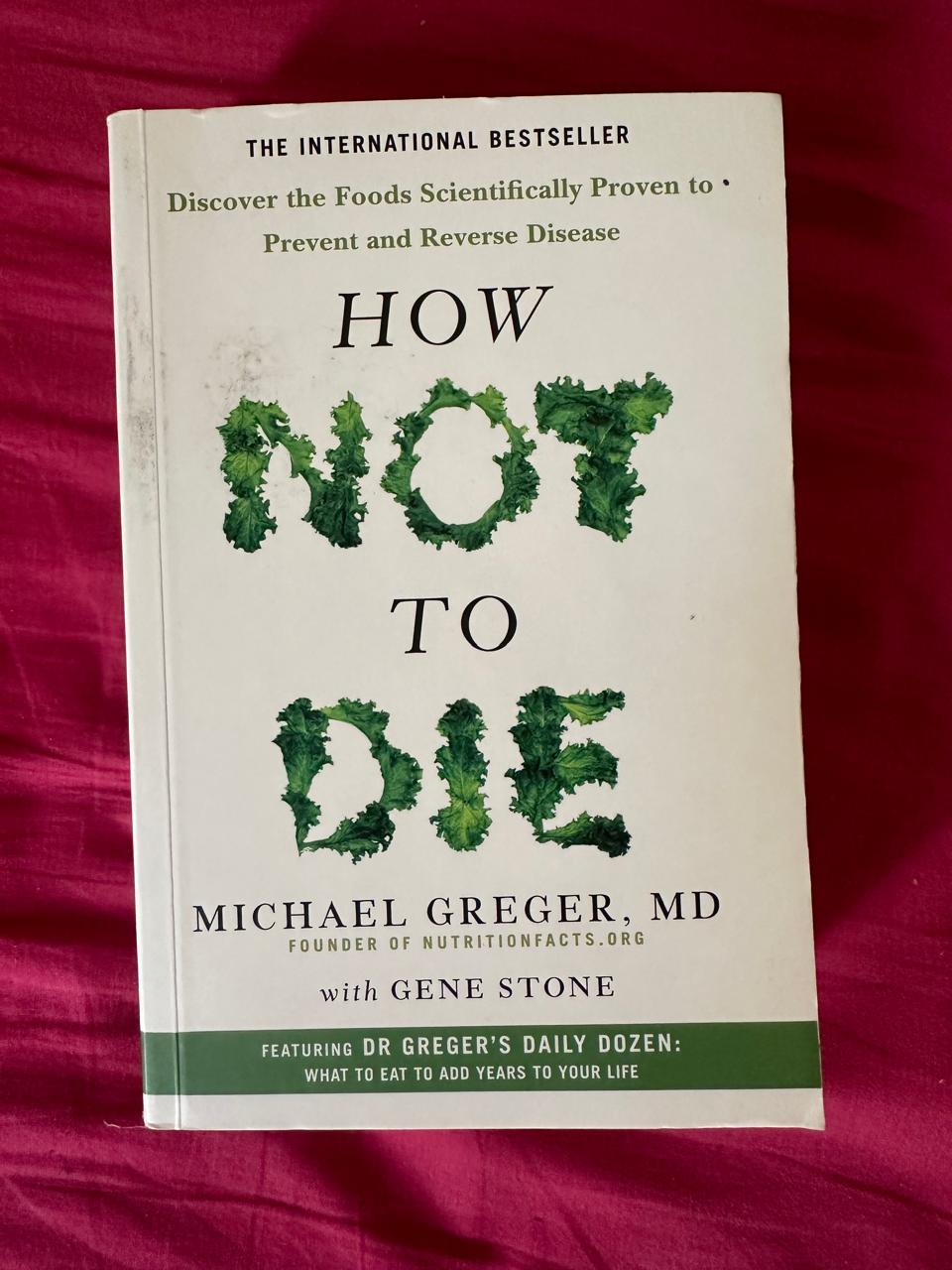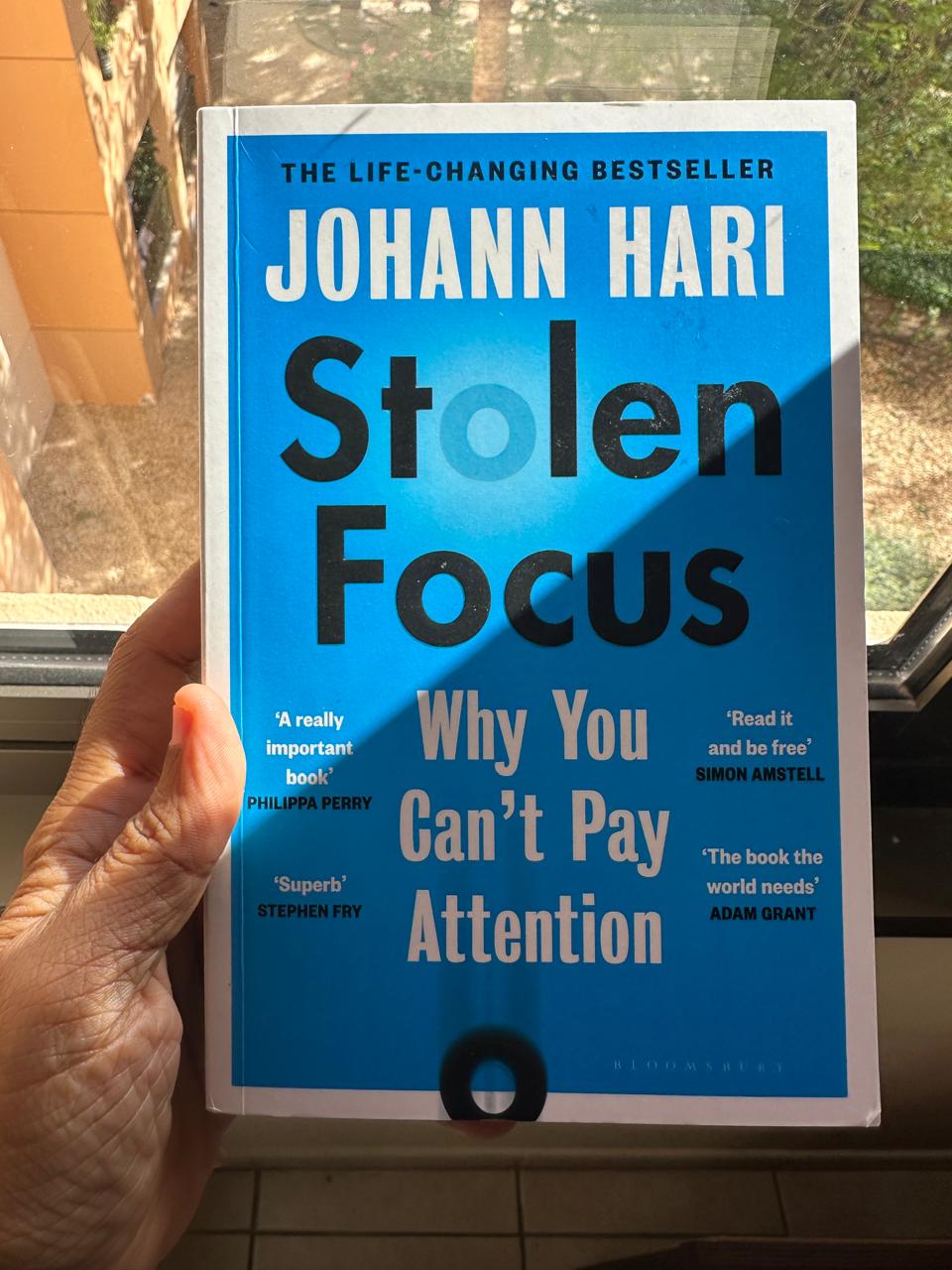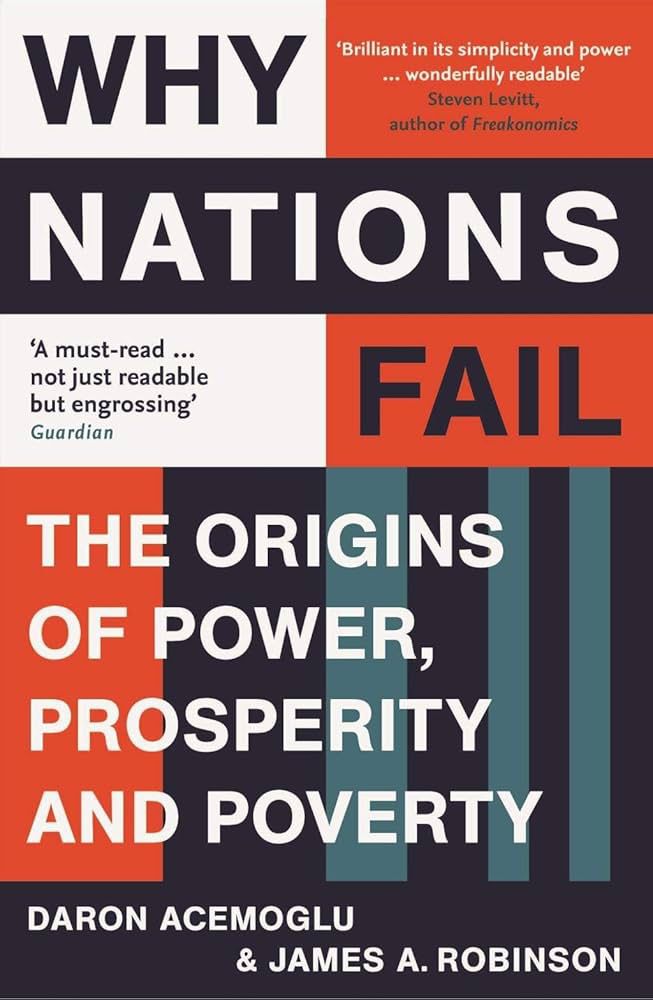
HomeStolen focus: why you can’t pay attention By Johann HariBook SummaryStolen focus: why you can’t pay attention By Johann Hari
Stolen focus: why you can’t pay attention By Johann Hari
June 1, 2024
Stolen focus: why you can’t pay attention By Johann Hari

- Binod Shankar
- Book Summary
My top 40 points:
Overview
- Hari breaks down the many causes of our lack of attention into two categories: too much and too little. Too much information, stress, surveillance and manipulation, and ADHD diagnoses. Not enough sleep, novel reading, navel gazing and nutritious food.
Cause 1: The increase in speed & switching
- Multitasking doesn’t work. One reason is the switch cost effect: when you switch from one task to another, your brain has to reconfigure. The second way switching harms your attention is the screw-up effect. When you switch between tasks, errors that wouldn’t have happened otherwise start to creep in.
- Your brain can only produce one or two thoughts in your conscious mind at once. That’s it. We’re very, very single-minded. This is not going to change. But rather than acknowledge this, we invented a myth that we can actually think about three, five, ten things at the same time.
- There’s this thing about speed that feels great. But we told ourselves we could have a massive expansion in the amount of information we are exposed to, and the speed at which it hits us, with no costs. This is a delusion: what we are sacrificing is depth in all sorts of dimensions.
Cause 2: The crippling of our flow states
- To find flow, choose one single goal; make sure your goal is meaningful to you; and try to push yourself to the edge of your abilities.
- To have a good life, it is not enough to remove what is wrong with it. We also need a positive goal. Many of us try to seek relief from distraction simply by crashing. But if you don’t replace rest with a positive goal—you will always be pulled back to distraction. The more powerful path out of distraction is to find your flow.
- The simplest and most common forms of flow that people experience in their lives is reading a book.
Cause 3: The rise of physical and mental exhaustion
- The first thing to go when you’re tired is your ability to pay attention.
- During sleep, your brain cleans itself of waste that has accumulated during the day. That can explain why, when you are tired, “you get a hung-over sort of feeling”—you are literally clogged up with toxins. This positive kind of brainwashing can only happen when you are asleep.
- If you’re not sleeping well, your body interprets that as an emergency. So, your body makes all these changes to prepare yourself for that emergency. Raise your blood pressure, make you want more fast food, make you want more sugar for quick energy, make your heart-rate rise. Your brain doesn’t know you’re sleep-deprived because you’re goofing off and watching Schitt’s Creek. But the net effect is a physiological sort of alarm bell
- We are now exposed to ten times the amount of artificial light that people were exposed to just fifty years ago.
Cause 4: The collapse of sustained reading
- Recreational reading at lowest ever recorded. Between 2004 and 2017, the number of men who read for pleasure dropped by 40% & women by 29%. Between 1978 – 2014, the no of people who had never read a book tripled.
- Reading used to train us to focus in a linear manner, from one thing to the next. The Internet has trained us to scan and skim. This sort of reading on the Internet bleeds over to normal reading and causes us to do the same with books
- The medium of the book tells us several things. Firstly, life is complex, and if you want to understand it, you have to set aside a fair bit of time to think deeply about it. Secondly, there is a value in narrowing down your attention to one thing. Thirdly, it is worth thinking deeply about how other people live and how their minds work.
- The more novels you read, the better you are at reading other people’s emotions. It was a huge effect. This isn’t just a sign that you are better educated—because reading nonfiction books, by contrast, has no effect on your empathy.
Cause 5: The disruption of mind wandering
- In situations of low stress and safety, mind-wandering will be a gift, a pleasure, a creative force. In situations of high stress or danger, mind-wandering will be a torment.
Cause 6: The rise of technology that can track and manipulate you
- The more people stared at their phones, the more money these companies made. Period. Their business model can only succeed if they take steps to dominate the attention spans of the wider society. It’s not their goal, any more than ExxonMobil deliberately wants to melt the Arctic. But it’s an inescapable effect of their current business model.
- Take care what technologies you use, because your consciousness will, over time, come to be shaped like those technologies.
- If you’re asleep, you’re not spending money, you’re not consuming anything, you’re not producing anything. If we slept a healthy amount, it would be an earthquake for our economic system. The attentional failures are just roadkill. That’s just the cost of doing business.
Cause 7: The rise of cruel optimism
- We live in an extremely individualistic culture, where we are constantly pushed to see our problems as individual failings, and to seek individual solutions. Unable to focus? Overweight? Poor? Depressed? Our culture says to think: That’s my fault. I should have found a way to lift myself up and out of these environmental problems.
- The truth is that you are living in a system that is pouring acid on your attention every day, and then you are being told to blame yourself and to fiddle with your own habits.
Cause 8: The surge in stress and how its triggering vigilance
- The top causes of stress in the U.S are a lack of health insurance, the constant threat of lay-offs, lack of discretion and autonomy in decision-making, long working hours, low levels of organizational justice, and unrealistic demands.
- To pay attention in normal ways, you need to feel safe.
Cause 9: Our deteriorating diets
- You eat a bowl of cereal and a slice of toast in the morning. Because there’s little fiber in there, glucose — which gives you energy - will be released rapidly. So, your blood sugar goes high, really quickly then it crashes down quickly, and you get brain fog. You sit at your desk and you struggle to think. Your child at school isn’t able to listen to the teacher.
- When this happens, you and your kid want more sugary-carby treats in order to get another short burst of focus. If every mealtime you’re consuming those shitty carbs, then you’re going to be going on that roller coaster over and over again.
- If you’re consuming those kinds of foods with caffeine, the effect on blood sugar is exaggerated even further
Cause 10: Rising pollution
- We are now surrounded by so many pollutants that there is no way we can have a normal brain today. The main culprits: Plasticizers. Flame-retardants. Cosmetics.
- The evidence is especially worrying when it comes to children’s brains, which are still developing. If your brain doesn’t develop normally, your attention can seriously suffer.
Cause 11: The rise of ADHD
- Between 2003 and 2011 alone, diagnoses of ADHD soared in the US by 43%. Now 13 % of adolescents in the U.S. have been given this diagnosis, and of them, a majority are given powerful stimulant drugs as a result.
- The huge rise in children being diagnosed with attention problems has coincided with several big changes in the way children live. Kids are now allowed to run around far less. Children are now fed a diet that lacks many nutrients needed for brain development. Children’s schooling now focuses on preparing them for high-stress testing, with very little space for nurturing their curiosity.
- Children who had experienced four or more types of trauma were 32.6 times more likely to have been diagnosed with attention or behavior problems.
- When children can’t pay attention, that’s often a signal that they are under terrible stress
- if you are in a dangerous environment, selective attention where you focus on just one thing is a really dumb strategy. What you need instead is to evenly spread vigilance around your environment, looking for cues for danger.
Cause 12: The confinement of children both physically and psychologically
- Aerobic exercise (play) expands the growth of brain connections, the frontal cortex and the brain chemicals that support self-regulation and executive functioning. Exercise helps the brain grow more and get more efficient.
- When you play, you have to use your creativity to come up with a game. You then have to persuade the other kids that your game is the best one they could play. Then “you figure out how to read people enough so that the game keeps going.” You have to learn how to negotiate.You learn how to cope with being disappointed, or frustrated.
- Kids develop focus by pursuing things that interest them. School closes them off from this. It also limits their physical movement, their ability to talk with peers, and their ability to ask questions
Solutions
- Ban surveillance capitalism, because people who are being hacked and deliberately hooked can’t focus.
- Introduce a four-day week, because people who are chronically exhausted can’t pay attention.
- Rebuild childhood around letting kids play freely because children who are imprisoned in their homes won’t be able to develop a healthy ability to pay attention.
- Move beyond the idea of growth to a ‘steady-state economy.’ Abandon economic growth as the driving principle of the economy. Redefine prosperity to mean having time to spend with our children, or to be in nature, or to sleep, or to dream, or to have secure work. Most people don’t want a fast life – they want a good life.



